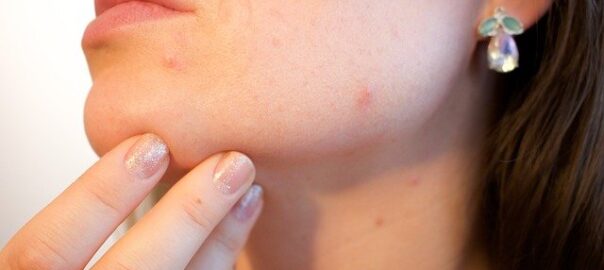While most of us are going crazy over skincare, we do not often realise different people have different skin types. Every skin type experiences different skin concerns and should be treated accordingly. Even the skin type within a family can differ from one another.
We have three main types of skin – normal, dry, oily and sensitive skin. While these are the most commonly occurring skin types, not many of us acknowledge this issue. You might have seen various skin care products made specifically for different skin types. One of those skin types that you hear about all the time is— sensitive skin.
Although normal and oily skin also needs care, sensitive skin type requires more attention and pampering. There are certain issues and factors considering this particular skin type. Is your skin type sensitive? Can you develop sensitive skin at any time in your life? Well, you’re probably not sure whether you have sensitive skin or how to take care of it. If these questions are troubling you, keep reading the article below to help you understand more about sensitive skin and how you can take care of it.
What is sensitive skin?
Sensitive skin is a skin condition that happens when a person applies harsh chemicals to their skin, it results in sensitivity and increased inflammation. In most cases, the skin turns red and develops acne due to decreased tolerability.
Most of the time, this sensitivity is not a medical diagnosis but is rather discovered by an individual itself. Either it can be since childhood or can develop later in the lifetime. Nevertheless, not everybody with sensitive skin knows that they have skin sensitivity or they do not realise it until their skin reacts to a harsh product.
People with this type of skin have to be aware of the products and chemicals that they put on their dermis. Even a change in the pH of the skin may end up in acne breakouts and redness.
Types of Sensitive skin
While we know that our normal skin can be dry or oily, it can be sensitive along with being any of them. It means one can have dry and sensitive skin also. It is why it is crucial to understand the different types of sensitive skin that are commonly found in people. Let us get into the details-
1. Naturally sensitive skin
Individuals with naturally sensitive skin can have it due to genetics. This particular type of sensitivity can be linked to inflammatory skin issues like eczema, psoriasis, and rosacea.
2. Environmentally sensitive skin
As the name indicates, this type of sensitivity is a result of environmental factors. Factors like air pollution, sun exposure, smoking, or anything that can irritate or sting your skin, may affect it.
3. Reactive Skin
Your skin is said to be reactive when it readily reacts to skin care products and becomes inflamed and irritated. Individuals with this type of skin often experience the formation of papules or pustules at the site where they applied their product.
4. Thin Skin
Our epidermis becomes thinner as we grow old. This natural thinning of the skin decreases its tolerability levels for different chemical compounds. Thus, making it sensitive and easier to irritate.
How to tell if you have sensitive skin and what causes it?
Many times when an individual introduces a new product in their skincare routine, there are chances that it might or might not suit them. People with sensitive skin often cannot tolerate products that contain harsh chemicals and strong fragrances.
Apart from this, people with sensitive skin can also react to cleansers and moisturisers that contain sulphates and parabens. In conclusion, when your skin often reacts to skincare items or sun damage, you are likely to have sensitive skin.
Sensitive skin is characterised when skin cells react immediately to a harsh chemical or exposure to the sun. The reaction can be in the form of inflammation like- rashes, acne, itching, tiny bumps, etc. An individual with this skin condition can either have sensitive skin right from the beginning or realise it when they put on a skin care product that is not meant for their specific skin type.
In most cases, sensitive skin is caused due to synthetic chemicals, unhygienic skin care products, compromised skin barrier (disrupted skin microbiota), or the skin’s internal factors. An internal factor could be genetic, dehydration, lack of moisturisation, dryness, or ageing. Although these are some of the causes that develop sensitivity, there are probably other reasons that contribute to the skin’s increased reaction to particular products.
What are the issues dealt with by individuals with skin sensitivity?
Individuals with skin sensitivity come across various concerns that are typical to their specific skin type.
If you count yourself as a sensitive type of skin, you might as well know the challenge that it comes with. You need to take care of your skin diligently while also making sure that you treat it with the most gentle and soothing ingredients. In case your skin does not receive the care and attention that it requires, it might break out due to increased sensitivity. Following are the skin-related issues faced by individuals with sensitivity –
-
- Your skin often reacts to new skincare products
- You get acne when applying makeup
- Skin gets sunburned easily
- Not every product suits your skin
- Your skin reacts aggressively to certain chemical ingredients
- You experience a burning or itching sensation with products that are not meant for sensitive skin type
- You notice tiny bumps on your face when you wash it with harsh cleansers
How to take care of sensitive skin?
Sensitive skin might give you a hard time dealing with it. However, it can be maintained with proper care and precautions.
Taking care of your sensitive skin also includes avoiding the specific chemicals or skin care products that irritate your skin. Not to forget, even a slight change in the pH of the water can also disturb the protective barrier (microbiome profile) of the epidermis. One can ensure that they avoid hard water and stick to mild skin care products when it comes to treating their skin. You can follow and ensure the points below to see a significant improvement in the health of your skin.
-
- Neither use too hot nor too cold water for showering. Instead, use lukewarm water.
- Avoid harsh exfoliating chemicals
- Use mild and fragrance-free products
- Use gentle laundry detergent as the clothes you wear also come in contact with your skin.
- Avoid rubbing and dragging motion with your towel. Instead, lightly pat yourself.
- Always do a patch test of a new product one day prior to a full application.
- Use skincare products that contain gentle ingredients like GENENCARE® XL
What is Xylitol?
Xylitol is a naturally occurring sugar alcohol in some plants. Although alcohol, it is a carbohydrate and does not really contain alcohol. Moreover, it has a sweet taste which is also used as a sweetener in confectioneries.
Talking of xylitol, it is a crystalline white or colourless solid substance which is soluble in water. It occurs naturally in fruits and vegetables. And hence, is extracted from sustainable plant sources.
The purified form of Xylitol that has a sustainable profile and is better than its conventional form is GENENCARE® XL. Not only this, it is good for your epidermal health and is also helpful in maintaining the overall integrity of sensitive skin. Let us learn more about this chemical and how it protects skin sensitivity.
How can GENENCARE® XL (xylitol) help support sensitive skin?
GENENCARE® XL is the processed and purified form of xylitol that is proving its benefits as a skincare ingredient. Just like xylitol, it is a white crystalline solid which is easily dissolvable in water. Besides this, this purified form is upcycled from beech wood. It makes it a preferable sustainable source of conventional xylitol.
GENENCARE® XL is manufactured in Finland and is used in industries dealing with skin care, hair care, cosmetics, and toiletries. Being a gentle and natural skin care ingredient, this purified form of xylitol can be a Holy Grail for individuals with skin sensitivity. Let us find out how.
It improves skin barrier functions
Your skin barrier is everything that protects the integrity of the epidermal layer. Most individuals who experience sensitivity have a compromised skin barrier that leads to skin breakouts and allergic reactions.
The skin barrier has everything to do with hydration, moisturisation, and protecting the microbiome diversity of the skin.
GENENCARE® XL enhances the overall functioning of the epidermal cells, thereby providing a better skin barrier. It improves the quality and cohesive characteristics of the stratum corneum. Besides this, it also improves and strengthens lipid layer composition and organisation.
Xylitol will not only benefit individuals with sensitive skin but also promote its health. An improved skin barrier will lead to fewer skin reactions and inflammation.
Provides hydration Lack of hydration can lead to increased dryness and a decline in the elasticity of skin cells. Dehydrated skin cells often lead to sensitivity and increase the chance of early signs of ageing. Hydrated skin contains enough water to keep it healthy and increase the dynamics of epidermal tissues. Apart from this, adding a hydrating agent to your skincare routine helps in improving its overall texture and helps the skin in resisting sensitive reactions. GENENCARE® XL is not only a potent humectant but also a mild compound that is most unlikely to cause skin irritation. As a hydrating agent, it attracts water molecules from the surroundings and retains them in the stratum corneum layer of your skin.
Protects skin microbiome
Our skin is protected and regulated by a large diversity of commensal microbes. They not only protect the integrity of the epidermal cells but also benefit the skin in numerous ways. Bacteria, fungi, and other microorganisms together make up the normal skin microbiota. While some of these microbes are beneficial for the skin, some can also cause infections.
Any injury or compromised physical barrier of the skin can lead infectious microbes to enter inside and cause diseases.
GENENCARE® XL create a healthy skin barrier that prevents infectious microorganisms from entering inside it. Moreover, it also enhances the growth of good bacteria that is necessary for protecting the skin microbiome while also declining the formation of harmful bacteria. The compound, GENENCARE® XL, supports the formation of S. epidermidis (benefits the skin) and represses the activity of S. aureus (skin-harming bacteria).
Gives your skin a cooling effect
Sensitive skin tends to feel warm or starts burning when it is under any kind of external or internal stress. Not only will it turn red but will also become irritated as a result of inflammation.
Common causes that end up making your epidermal tissues more inflamed and sensitive can be— exposure to too much sunlight, using products that are not meant for sensitive skin, or any external or internal injury.
GENENCARE® XL also acts as a cooling agent that can provide soothing sensations by absorbing heat energy from its surroundings. This compound when applied to the surface of your skin will provide a soothing and cooling effect, thereby aiding the sensitive areas.
Keeps your skin well moisturized
Lack of moisturisation can lead to dry cracks on the surface of your skin. Eventually, allowing bacteria and other infectious microbes to enter it and cause inflammation. Moisturisation not only improves the texture of the skin but also balances the amount of water loss. Proper moisturization of sensitive skin can result in fewer breakouts and increase the chances of new cell formation. Not only this, but the natural origin of this compound has less chance of irritating sensitive skin while also providing moisturisation for up to 8 hours.
Sustainability factors of GENENCARE® XL
SinceGENENCARE® XL is a revolutionary ingredient in the skincare industry, its popularity is mainly because of its sustainable aspects. The fact that it is derived from upcycled beech wood supports its environmental integrity for the planet. GENENCARE® XL is COSMOS Certified Xylitol that is an added advantage to its sustainability factor.
Apart from this, its extraction methods do not have a negative impact on the environment. It is biodegradable with no use of petrochemical solvents. With lesser greenhouse gas emissions and land use, GENENCARE® XL displays a more sustainable profile than the rest of the xylitol sources.
Conclusion
GENENCARE® XL is the purified form of conventional xylitol that is nature-based and carries a whole lot of skin benefits for skin sensitivity. This particular compound possesses all the advantageous qualities that are needed in an ingredient to improve the health of sensitive skin.
Apart from this, GENENCARE® XL shows a sustainable profile when compared to other xylitol compounds. It is a plant-based chemical which is produced in Finland and sourced from Europe. Besides benefiting sensitive skin, it also nourishes it. In conclusion, it is a great ingredient to treat sensitivity and is easy to formulate with other cosmetic products.




